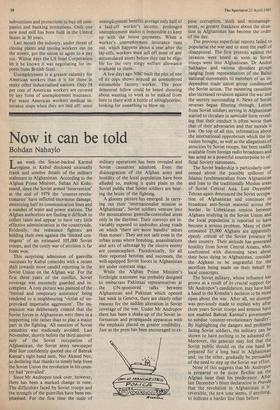Now it can be told
Bohdan Nahaylo
T ast week the Soviet-backed Karmal Laregime in Kabul disclosed unusually frank and sombre details of the military stalemate in Afghanistan. According to the Afghan Prime Minister, Sultan Ali Kisht- mand, since the Soviet armed 'intervention' at the end of 1979 the 'counter-revolu- tionaries' have inflicted enormous damage, destroying half its communication lines and a number of water and power stations. The Afghan authorities are finding it difficult to collect taxes and appear to have very little effective administration in the countryside. Evidently, the resistance fighters are holding their own against the 'limited con- tingent' of an estimated 105,000 Soviet troops, and the costly war of attrition is far from won.
This surprising admission of guerrilla successes by Kabul coincides with a recent shift towards more candid reporting in the Soviet Union on the Afghan war. For the first three years of the conflict, Soviet coverage was extremely guarded and in- complete. A rosy picture was painted of the `limited and temporary assistance' being rendered to a neighbouring 'victim of un- provoked imperialist aggression'. The im- pression was deliberately created that the Soviet forces in Afghanistan were there in a supporting role rather than to play a major part in the fighting. All mention of Soviet casualties was studiously avoided. Last November, shortly before the third anniver- sary of the Soviet occupation of Afghanistan, the Soviet army newspaper Red Star confidently quoted one of Babrak Kamal's right-hand men, Nur Akmed Nur, as declaring that thanks to timely help from the Soviet Union the revolution in his coun- try had 'prevailed'.
Since Mr Andropov took over, however, there has been a marked change in tone. The difficulties faced by Soviet troops and the strength of the guerrillas have been em- phasised. For the first time the scale of military operations has been revealed and Soviet casualties admitted. Even the disintegration of the Afghan army and hostility of the local population have been alluded to, making it quite plain to the Soviet public that Soviet soldiers are bear- ing the brunt of the fighting.
A gloomy picture has emerged. In carry- ing out their 'internationalist mission in Afghanistan', Soviet soldiers venture into the mountainous guerrilla-controlled areas only in the daytime. Their convoys are in- variably exposed to ambushes along roads on which 'there are more bandits' mines than stones'. They are not safe even in the urban areas where bombing, assassinations and acts of sabotage by the elusive enemy are commonplace. Paradoxically, for all their reported heroism and successes, the well-equipped Soviet forces in Afghanistan are under constant siege.
While the Afghan Prime Minister's forthright statement was probably designed to embarrass Pakistani representatives at the UN-sponsored talks between Afghanistan and Pakistan which opened last week in Geneva, there are clearly other reasons for the sudden alteration in Soviet coverage of the war. Under Mr Andropov there has been a shake-up of the Soviet in- formation and propaganda apparatus with the emphasis placed on greater credibility. Just as the press has been encouraged to ex-
pose corruption, sloth and mismanage- ment, so greater frankness about the situa- tion in Afghanistan has become the order of the day.
The previous superficial reports failed to popularise the war and to stem the swell of disapproval. The first protests against the invasion were heard as soon as Soviet troops went into Afghanistan. Dr Andrei Sakharov and various dissident groups ranging from representatives of the Baltic national movements to members of an in- dependent trade union group condemned the Soviet action. The mounting casualites also increased revulsion against the war and the secrecy surrounding it. News of Soviet reverses began filtering through. Letters from Soviet soldiers serving in Afghanistan started to circulate in samizdat form reveal- ing that their conduct is often worse than that of their adversaries and that morale is low. On top of all this, information about the international opprobrium which the in- vasion brought, as well as the allegations of atrocities by Soviet troops, has been readily available from foreign radio broadcasts and has acted as a powerful counterpoise to of- ficial Soviety statements.
The Soviet leadership is particularly con- cerned about the possible spillover of Islamic fundamentalism from Afghanistan and Iran to the traditionally Muslim areas of Soviet Central Asia. Last December Tehran again denounced the Soviet occupa- tion of Afghanistan and continues to broadcast anti-Soviet material across the border. In Uzbekistan tension between Afghans studying in the Soviet Union and the local population is reported to have become a serious problem. Many of these estimated 25,000 Afghans are apparently openly critical of the Soviet presence in their country. Their attitude has generated hostility from Soviet Central Asians, who, confronted with distressing news about their boys dying in Afghanistan, consider the Afghans to be ungrateful for the sacrifices being made on their behalf by local conscripts.
The Soviet military, whose influence has grown as a result of its crucial support for Mr Andropov's candidature, may have had a hand in the Kremlin's decision to be more open about the war. After all, no attempt was previously made to explain why after three years Soviet troops and armour have not enabled Babrak Karmal's government to. subdue 'counter-revolutionary bandits'. By highlighting the dangers and problems facing Soviet soldiers, the military can be shown to have nothing to be ashamed of. Moreover, the generals may feel that the Soviet public should on the one hand be prepared for a long haul in Afghanistan and, on the other, gradually be persuaded of the need to step up the Soviet war effort. None of this suggests that Mr Andropov is prepared to be more flexible on the Afghan issue than his predecessor. After last December's blunt declaration in Pravda that the revolution in Afghanistan is ir- reversible, the new tone seems, if anything, to indicate a harder line than before.










































 Previous page
Previous page